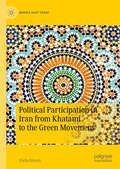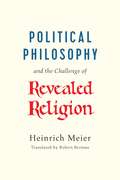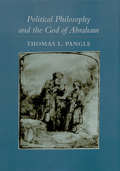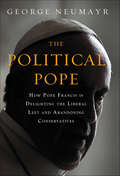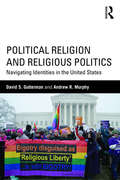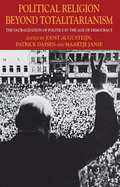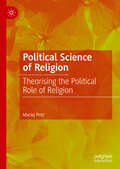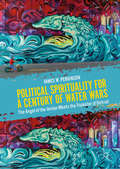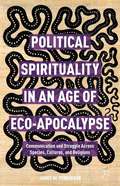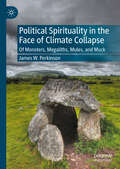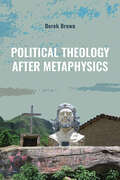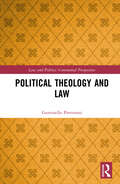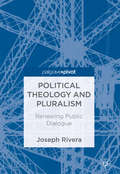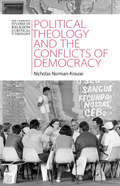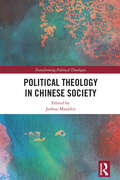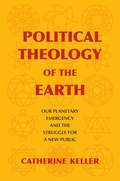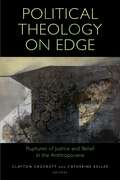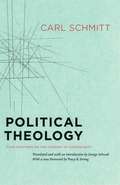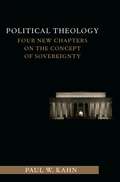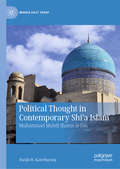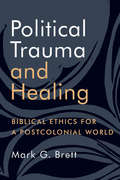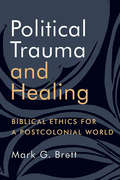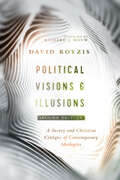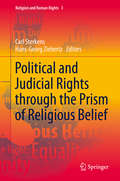- Table View
- List View
Political Participation in Iran from Khatami to the Green Movement (Middle East Today)
by Paola RivettiThis book examines the unintended consequences of top-down reforms in Iran, analysing how the Iranian reformist governments (1997–2005) sought to utilise gradual reforms to control independent activism, and how citizens responded to such a disciplinary action. While the governments successfully ‘set the field’ of permitted political participation, part of the civil society that took shape was unexpectedly independent. Despite being a minority, independent activists were not marginal: without them, in fact, the Green Movement of 2009 would not have taken shape. Building on in-depth empirical analysis, the author explains how autonomous activism forms and survives in a semi-authoritarian country. The book contributes to the debate about the implications of elite-led reforms for social reproduction, offering an innovative interpretation and an original analysis of social movements from a political science perspective.
Political Philosophy and the Challenge of Revealed Religion
by Heinrich Meier Robert BermanHeinrich Meier’s guiding insight in Political Philosophy and the Challenge of Revealed Religion is that philosophy must prove its right and its necessity in the face of the claim to truth and demand obedience of its most powerful opponent, revealed religion. Philosophy must rationally justify and politically defend its free and unreserved questioning, and, in doing so, turns decisively to political philosophy. In the first of three chapters, Meier determines four intertwined moments constituting the concept of political philosophy as an articulated and internally dynamic whole. The following two chapters develop the concept through the interpretation of two masterpieces of political philosophy that have occupied Meier’s attention for more than thirty years: Leo Strauss’s Thoughts on Machiavelli and Jean-Jacques Rousseau’s Social Contract. Meier provides a detailed investigation of Thoughts on Machiavelli, with an appendix containing Strauss’s original manuscript headings for each of his paragraphs. Linking the problem of Socrates (the origin of political philosophy) with the problem of Machiavelli (the beginning of modern political philosophy), while placing between them the political and theological claims opposed to philosophy, Strauss’s most complex and controversial book proves to be, as Meier shows, the most astonishing treatise on the challenge of revealed religion. The final chapter, which offers a new interpretation of the Social Contract, demonstrates that Rousseau’s most famous work can be adequately understood only as a coherent political-philosophic response to theocracy in all its forms.
Political Philosophy and the God of Abraham
by Thomas L. PangleIn this book noted scholar Thomas L. Pangle brings back a lost and crucial dimension of political theory: the mutually illuminating encounter between skeptically rationalist political philosophy and faith-based political theology guided ultimately by the authority of the Bible. Focusing on the chapters of Genesis in which the foundation of the Bible is laid, Pangle provides an interpretive reading illuminated by the questions and concerns of the Socratic tradition and its medieval heirs in the Christian, Jewish, and Islamic worlds. He brings into contrast the rival interpretive framework set by the biblical criticism of the modern rationalists Hobbes and Spinoza, along with their heirs from Locke to Hegel. The full meaning of these diverse philosophic responses to the Bible is clarified through a dialogue with hermeneutic discussions by leading political theologians in the Judaic, Muslim, and Christian traditions, from Josephus and Augustine to our day. Profound and subtle in its argument, this book will be of interest not only to students and scholars of politics, philosophy, and religion but also to thoughtful readers in every walk of life who seek to deepen their understanding of the perplexing relationship between religious faith and philosophic reason.
Political Pope: How Pope Francis Is Delighting the Liberal Left and Abandoning Conservatives
by George NeumayrThe untold story of the left's efforts to politicize the Vatican and the battle to stop it-before the Catholic Church as we know it is destroyed. Pope Francis is the most liberal pope in the history of the Catholic Church. He is not only championing the causes of the global Left, but also undermining centuries-old Catholic teaching and practice. In the words of the late radical Tom Hayden, his election was "more miraculous, if you will, than the rise of Barack Obama in 2008." But to Catholics in the pews, his pontificate is a source of alienation. It is a pontificate, at times, beyond parody: Francis is the first pope to approve of adultery, flirt with proposals to bless gay marriages and cohabitation, tell atheists not to convert, tell Catholics to not breed "like rabbits," praise the Koran, support a secularized Europe, and celebrate Martin Luther. At a time of widespread moral relativism, Pope Francis is not defending the Church's teachings but diluting them. At a time of Christian persecution, he is not strengthening Catholic identity but weakening it. Where other popes sought to save souls, he prefers to "save the planet" and play politics, from habitual capitalism-bashing to his support for open borders and pacifism. In The Political Pope, George Neumayr gives readers what the media won't: a bracing look at the liberal revolution that Pope Francis is advancing in the Church. To the radical academic Cornel West, "Pope Francis is a gift from heaven." To many conservative Catholics, he is the worst pope in centuries.
Political Religion and Religious Politics: Navigating Identities in the United States (Routledge Series on Identity Politics)
by Andrew R. Murphy David S. GuttermanProfound demographic and cultural changes in American society over the last half century have unsettled conventional understandings of the relationship between religious and political identity. The "Protestant mainline" continues to shrink in numbers, as well as in cultural and political influence. The growing population of American Muslims seek both acceptance and a firmer footing within the nation’s cultural and political imagination. Debates over contraception, same-sex relationships, and "prosperity" preaching continue to roil the waters of American cultural politics. Perhaps most remarkably, the fastest-rising religious demographic in most public opinion surveys is "none," giving rise to a new demographic that Gutterman and Murphy name "Religious Independents." Even the evangelical movement, which powerfully re-entered American politics during the 1970s and 1980s and retains a strong foothold in the Republican Party, has undergone generational turnover and no longer represents a monolithic political bloc. Political Religion and Religious Politics:Navigating Identities in the United States explores the multifaceted implications of these developments by examining a series of contentious issues in contemporary American politics. Gutterman and Murphy take up the controversy over the "Ground Zero Mosque," the political and legal battles over the contraception mandate in the Affordable Health Care Act and the ensuing Supreme Court Hobby Lobby decision, the national response to the Great Recession and the rise in economic inequality, and battles over the public school curricula, seizing on these divisive challenges as opportunities to illuminate the changing role of religion in American public life. Placing the current moment into historical perspective, and reflecting on the possible future of religion, politics, and cultural conflict in the United States, Gutterman and Murphy explore the cultural and political dynamics of evolving notions of national and religious identity. They argue that questions of religion are questions of identity -- personal, social, and political identity -- and that they function in many of the same ways as race, sex, gender, and ethnicity in the construction of personal meaning, the fostering of solidarity with others, and the conflict they can occasion in the political arena.
Political Religion beyond Totalitarianism
by Joost Augusteijn Patrick Dassen Maartje JanseThe success of fascist and communist regimes has long been explained by their ability to turn political ideology into a type of religion. These innovative essays explore the notion that all forms of modern mass-politics, including democracies, need a form of sacralization to function.
Political Science of Religion: Theorising the Political Role of Religion
by Maciej PotzThis book introduces political science of religion – a coherent approach to the study of the political role of religion grounded in political science. In this framework, religion is viewed as a political ideology providing legitimation for power and motivating political attitudes and behaviors of the public. Religious organizations are political actors negotiating the political system in the pursuit of their faith-based objectives. Religion is thus interpreted as a power resource and religious groups as political players. The theoretical framework developed in the first part is applied to the study of theocracies and contemporary democracies, based on the case studies of Poland and the USA. The empirical analysis of resources, strategies and opportunities of religious actors demonstrates their ability to influence the politics of democracies and non-democracies alike. Using a multilevel approach, the book seeks to explain this tremendous political potential of religion.
Political Spirituality for a Century of Water Wars: The Angel of the Jordan Meets the Trickster of Detroit
by James W. PerkinsonThis book offers resources for re-imagining the biblical vision of water for a time quickly emerging as “the century of water wars.” It takes its urgency from the author’s 5-year activist engagement with a grass-roots-led social movement, pushing back on Detroit water shutoffs as global climate crises intensify. Concerned with both white supremacist “biopolitics” and continuing settler colonial reliance on the Doctrine of Christian Discovery, and beholden to an interreligious methodology of “crossing over and coming back,” the text creatively re-reads the biblical tradition under tutelage to the mythologies and practices of various indigenous cultures (Algonquian/Huron, Haitian/Vodouisant, and Celtic/Norman) whose embrace of water is animate and spiritual as well as political and communal. Not enough, today, merely to engage the political battle over water rights, however; indigenous wisdom and biblical prophecy alike insist that recovery of water spirituality is central to a sustainable future.
Political Spirituality for a Century of Water Wars: The Angel of the Jordan Meets the Trickster of Detroit
by James W. PerkinsonThis book offers resources for re-imagining the biblical vision of water for a time quickly emerging as “the century of water wars.” It takes its urgency from the author’s 5-year activist engagement with a grass-roots-led social movement, pushing back on Detroit water shutoffs as global climate crises intensify. Concerned with both white supremacist “biopolitics” and continuing settler colonial reliance on the Doctrine of Christian Discovery, and beholden to an interreligious methodology of “crossing over and coming back,” the text creatively re-reads the biblical tradition under tutelage to the mythologies and practices of various indigenous cultures (Algonquian/Huron, Haitian/Vodouisant, and Celtic/Norman) whose embrace of water is animate and spiritual as well as political and communal. Not enough, today, merely to engage the political battle over water rights, however; indigenous wisdom and biblical prophecy alike insist that recovery of water spirituality is central to a sustainable future.
Political Spirituality in an Age of Eco-Apocalypse
by James W. PerkinsonThis book 'hunts and gathers' across different historical epochs and situations, juxtaposing biblical materials and hip-hop, Christian colonialism and vodou, personal experience and racial politics, poetics and high theory. It is compelled by a desire to challenge the current crisis of sustainability from the point of view of indigenous communities and deep ancestry. Author James W. Perkinson ably synthesizes material from a diverse range of fields, including anarcho-primitivism, biblicalstudies, and history of religions in order to argue for a 'turn to indigeneity. ' The book's motive force is a deep concern for humanity's future in the face of eco-disasters like climate change and population overshoot as well as the compounding problems brought on by political economy calamities. Given the growing trend toward a turn away from institutionalized religious commitment and toward a more generalized and post-modern mix of practices and interests typically styled as 'spiritual,' the work proposes 'political spirituality' as a theme for investigation. Throughout the book, Perkinson raises the question: What does it really meant to be a human being? This query is posed not merely as a philosophical inquiry or existential musing, but as a personal and political conundrum arising from the overwhelming crises now engulfing our global reality. The book constitutes a poetic 'walk about' across quite different historical epochs and disparate contexts. Creatively foraging for indigenous memories and insurgent energies to help us live and cope in our modern state of unsustainability, the work aims to re-animate love of the wild and 'interspecies listening' for the sake of survival. The text articulates a deep suspicion toward our growing fascination with a kind of 'techno-messianism,' while nonetheless exploring some of the artistic innovations and meanings emerging from industrialization and digitalization.
Political Spirituality in the Face of Climate Collapse: Of Monsters, Megaliths, Mules, and Muck
by James W. PerkinsonThis book takes its motive force from our contemporary climate crisis. It seeks to reorient human (and especially Christian) understanding, towards a more ecologically-focused, indigenously-informed way-of-living. James W. Perkinson argues that our current eco-climatic and socio-political emergency is the culmination of a 5,000-year history of supremacist “settlement,” in which city-states first emergent in Mesopotamia and Egypt not only begin coercively organizing labor into surplus production and ecosystems into inordinate and destructive yields of “goods,” but in the process, also simultaneously “deform” the Spirit-World “haloing” of natural phenomenon into outsized service of imperial reach. Perkinson recognizes globalized humanity as an emerging monstrosity destroying both human culture and the world. How we re-envision and revalue, at our critical juncture, our inescapable interdependence with the more-than-human world as peer and teacher and even “elder,” is the central theme that throbs below the surface of the very disparate topics commanding attention in each chapter.
Political Theology after Metaphysics (SUNY series in Theology and Continental Thought)
by Derek BrownIn Political Theology after Metaphysics, Derek Brown argues that theologians and religious believers should pursue a revolutionary political theology that can address racism, sexism, and other forms of oppression in practical ways, rather than following the sorts of metaphysical theologies that have dominated theological discourse since at least the scholastic period. Relying primarily on Marxist and deconstructive critiques of the ideological function of metaphysics, the book engages a wide range of classical and contemporary figures, including Karl Marx, Søren Kierkegaard, Carl Schmitt, Jacques Derrida, James Cone, Chantal Mouffe, Cornel West, Martin Hägglund, and Karl Ove Knausgård. These engagements are attentive not only to the ways in which these figures critique or defend metaphysics, but also to the ways in which they perform political theologies responsive to those critiques. While the so-called postmodern critique of metaphysics—which Brown problematizes as insufficiently critical of political ideology—is often read as a challenge to religion, Brown’s readings suggest that the deconstructive and Marxist critiques of metaphysics present an opportunity for the reemergence of a historical and politically engaged form of religion.
Political Theology and Law (Law and Politics)
by Geminello PreterossiThis book addresses two main questions. Can political theology be overcome? And, is what today – in referring to neoliberalism and its genealogy – many define as "economic theology" truly an alternative to political theology, as Foucault has claimed and as Agamben does today? As a first step, the book addresses and clarifies various misunderstandings about the notion of political theology, in its multiple and even opposite meanings. It then focuses on a conceptualisation inaugurated by Carl Schmitt, which sees political theology as the eloquent matrix of modern politics: insofar as the latter produces and continuously re-elaborates an "excess" that does not belong to it, its core remains theological-political, although secularised. The bulk of the book then pursues a reading of the analogic connection between juridico-political concepts and theological-metaphysical concepts; arguing that, although the ‘turn’ to economic theology is indeed another form of political theology, it is a deeply anti-political one, which forecloses modes of resistance. The book will be of interest to scholars, researchers and advanced students in the fields of modern political and legal philosophy and those researching the crisis of its legacy. In particular, it is addressed to those who study the relationship between theology (and its substitutes, such as hegemony and political myth) and politics, power and law, legitimacy and legality, in the perspective of secularization. In addition, the book offers a contribution to contemporary critical studies on the neoliberal state and the return of the "state of exception" in democracies, as well as a questioning of the moralization of law, which is an effect of globalist ideology and the "humanitarian turn" after 1989.
Political Theology and Pluralism: Renewing Public Dialogue
by Joseph RiveraReviving the ancient political wisdom of St. Augustine in combination with insights drawn from contemporary political theorist John Rawls, Joseph Rivera grapples with the polarizing nature of religion in the public square. Political theology, as a discipline, tends to argue that communitarianism remains the only viable political option for religious practitioners in a complex, pluralist society. Unsurprisingly, we are increasingly accustomed to think the religious voice is anti-secular and illiberal. On the contrary, Christian theology and political liberalism, Rivera argues, are not incompatible. Political Theology and Pluralism challenges the longstanding antithesis between theology and political liberalism by asking his readers to focus not on difference, but on our common humanity. Outlining real strategies for public dialogue in a liberal state, Rivera offers the opportunity to discover what it means to practice civic friendship in pluralist context.
Political Theology and the Conflicts of Democracy (New Cambridge Studies in Religion and Critical Thought)
by Nicholas Norman-KrauseNicholas Norman-Krause argues, in this authoritative and sophisticated new treatment of conflict, that contestation is a basic - potentially regenerative - aspect of any flourishing democratic politics. In developing a distinctive 'agonistic theology,' and relating the political theory of agonism to social and democratic life, the author demonstrates that the conflicts of democracy may have a beneficial significance and depend at least in part on faith traditions and communities for their successful negotiation. In making his case, he deftly examines a rich range of religious and secular literatures, whether from the thought of Augustine, Aquinas, and Stanley Cavell or from less familiar voices such as early modern jurist and political thinker Johannes Althusius and twentieth-century Catholic social philosopher Yves Simon. Liberationists including Gustavo Gutiérrez and Martin Luther King, Jr. are similarly recruited for a theological account of conflict read not just as concomitant to, but also as constitutive of, democratic living.
Political Theology in Chinese Society (Transforming Political Theologies)
by Joshua MauldinThis book provides an itinerary for studying political theology in Chinese society, including mainland China, Hong Kong, and Taiwan. It explores the changing role of religion in Chinese history, from the rise of Buddhism alongside Confucianism and Daoism, through the arrival of Christianity and Islam, to the suppression of religion under communism. Since the reform and opening period beginning in 1978, China has experienced a resurgence of religiosity, with powerful societal implications. Governing authorities have sought to regulate religious practice in line with their governing system. Political theology in Chinese society is very much in flux and the chapters in this volume provide an array of windows through which to view the evolving reality. They include historical approaches and descriptive analyses, with an interdisciplinary and international range of perspectives by contributors based in and outside China. The book will be of particular interest to scholars of theology, religious studies, and contemporary China studies.
Political Theology of the Earth: Our Planetary Emergency and the Struggle for a New Public (Insurrections: Critical Studies in Religion, Politics, and Culture)
by Catherine KellerAmid melting glaciers, rising waters, and spreading droughts, Earth has ceased to tolerate our pretense of mastery over it. But how can we confront climate change when political crises keep exploding in the present? Noted ecotheologian and feminist philosopher of religion Catherine Keller reads the feedback loop of political and ecological depredation as secularized apocalypse. Carl Schmitt’s political theology of the sovereign exception sheds light on present ideological warfare; racial, ethnic, economic, and sexual conflict; and hubristic anthropocentrism. If the politics of exceptionalism are theological in origin, she asks, should we not enlist the world’s religious communities as part of the resistance?Keller calls for dissolving the opposition between the religious and the secular in favor of a broad planetary movement for social and ecological justice. When we are confronted by populist, authoritarian right wings founded on white male Christian supremacism, we can counter with a messianically charged, often unspoken theology of the now-moment, calling for a complex new public. Such a political theology of the earth activates the world’s entangled populations, joined in solidarity and committed to revolutionary solutions to the entwined crises of the Anthropocene.
Political Theology on Edge: Ruptures of Justice and Belief in the Anthropocene (Transdisciplinary Theological Colloquia)
by Clayton Crockett and Catherine KellerIn Political Theology on Edge, the discourse of political theology is seen as situated on an edge—that is, on the edge of a world that is grappling with global warming, a brutal form of neoliberal capitalism, protests against racism and police brutality, and the COVID-19 pandemic. This edge is also a form of eschatology that forces us to imagine new ways of being religious and political in our cohabitation of a fragile and shared planet. Each of the essays in this volume attends to how climate change and our ecological crises intersect and interact with more traditional themes of political theology.While the tradition of political theology is often associated with philosophical responses to the work of Carl Schmitt—and the critical attempts to disengage religion from his rightwing politics—the contributors to this volume are informed by Schmitt but not limited to his perspectives. They engage and transform political theology from the standpoint of climate change, the politics of race, and non-Christian political theologies including Islam and Sikhism. Important themes include the Anthropocene, ecology, capitalism, sovereignty, Black Lives Matter, affect theory, continental philosophy, destruction, and suicide. This book features world renowned scholars and emerging voices that together open up the tradition of political theology to new ideas and new ways of thinking.Contributors: Gil Anidjar, Balbinder Singh Bhogal, J. Kameron Carter, William E. Connolly, Kelly Brown Douglas, Seth Gaiters, Lisa Gasson-Gardner, Winfred Goodwin, Lawrence Hillis, Mehmet Karabela, Michael Northcott, Austin Roberts, Noëlle Vahanian, Larry L. Welborn
Political Theology: Four Chapters on the Concept of Sovereignty
by Carl SchmittWritten in the intense political and intellectual tumult of the early years of the Weimar Republic, Political Theology develops the distinctive theory of sovereignty that made Carl Schmitt one of the most significant and controversial political theorists of the twentieth century. Focusing on the relationships among political leadership, the norms of the legal order, and the state of political emergency, Schmitt argues in Political Theology that legal order ultimately rests upon the decisions of the sovereign. According to Schmitt, only the sovereign can meet the needs of an "exceptional" time and transcend legal order so that order can then be reestablished. Convinced that the state is governed by the ever-present possibility of conflict, Schmitt theorizes that the state exists only to maintain its integrity in order to ensure order and stability. Suggesting that all concepts of modern political thought are secularized theological concepts, Schmitt concludes Political Theology with a critique of liberalism and its attempt to depoliticize political thought by avoiding fundamental political decisions.
Political Theology: Four New Chapters on the Concept of Sovereignty (Columbia Studies in Political Thought / Political History)
by Paul KahnIn this strikingly original work, Paul W. Kahn rethinks the meaning of political theology. In a text innovative in both form and substance, he describes an American political theology as a secular inquiry into ultimate meanings sustaining our faith in the popular sovereign. Kahn works out his view through an engagement with Carl Schmitt's 1922 classic, Political Theology: Four Chapters on the Concept of Sovereignty. He forces an engagement with Schmitt's four chapters, offering a new version of each that is responsive to the American political imaginary. The result is a contemporary political theology. As in Schmitt's work, sovereignty remains central, yet Kahn shows how popular sovereignty creates an ethos of sacrifice in the modern state. Turning to law, Kahn demonstrates how the line between exception and judicial decision is not as sharp as Schmitt led us to believe. He reminds readers that American political life begins with the revolutionary willingness to sacrifice and that both sacrifice and law continue to ground the American political imagination. Kahn offers a political theology that has at its center the practice of freedom realized in political decisions, legal judgments, and finally in philosophical inquiry itself.
Political Thought in Contemporary Shi‘a Islam: Muhammad Mahdi Shams al-Din (Middle East Today)
by Farah W. KawtharaniThis book offers an intellectual history of one of the leading Shi’i thinkers and religious leaders of the 20th-century in Lebanon, Shaykh Muhammad Mahdi Shams al-Din. The author examines his role as the foremost figure of Shi’i intellectual life, a key associate of Musa al-Sadr, and president of the Islamic Shi‘i Supreme Council of Lebanon, having maintained the independence of this institution until his death from the domination of Shi‘i political parties. The core of the book consists of three interrelated main themes that constitute the major threads of Shams al-Din’s intellectual legacy: a discussion of Islamic government involving a critique of Khomeini’s theory of wilāyat al-faqīh, the role of Islam within civil government, and the necessity for political integration of the Shi‘a in their Arab nation-states to protect them from policies that raise doubts over their political allegiance to their respective countries. The project will appeal to scholars, students, academics, and researchers in Middle Eastern politics and history.
Political Trauma and Healing: Biblical Ethics for a Postcolonial World
by Mark G. BrettHow can Scripture address the crucial justice issues of our time? In this book Mark Brett offers a careful reading of biblical texts that speak to such pressing public issues as the legacies of colonialism, the demands of asylum seekers, the challenges of climate change, and the shaping of redemptive economies. Brett argues that the Hebrew Bible can be read as a series of reflections on political trauma and healing — the long saga of successive ancient empires violently asserting their sovereignty over Israel and of the Israelites forced to live out new pathways toward restoration. Brett retrieves the prophetic voice of Scripture and applies it to our contemporary world, addressing current justice issues in a relevant, constructive, compelling manner.
Political Trauma and Healing: Biblical Ethics for a Postcolonial World
by Mark G. BrettHow can Scripture address the crucial justice issues of our time? In this book Mark Brett offers a careful reading of biblical texts that speak to such pressing public issues as the legacies of colonialism, the demands of asylum seekers, the challenges of climate change, and the shaping of redemptive economies. Brett argues that the Hebrew Bible can be read as a series of reflections on political trauma and healing — the long saga of successive ancient empires violently asserting their sovereignty over Israel and of the Israelites forced to live out new pathways toward restoration. Brett retrieves the prophetic voice of Scripture and applies it to our contemporary world, addressing current justice issues in a relevant, constructive, compelling manner.
Political Visions & Illusions: A Survey & Christian Critique of Contemporary Ideologies
by David T. KoyzisWhat you believe about politics matters. The decades since the Cold War, with new alignments of post–9/11 global politics and the chaos of the late 2010s, are swirling with alternative visions of political life, ranging from ethnic nationalism to individualistic liberalism. Political ideologies are not merely a matter of governmental efficacy, but are intrinsically and inescapably religious: each carries certain assumptions about the nature of reality, individuals and society, as well as a particular vision for the common good. These fundamental beliefs transcend the political sphere, and the astute Christian observer can discern the ways—sometimes subtle, sometimes not—in which ideologies are rooted in idolatrous worldviews. In this freshly updated, comprehensive study, political scientist David Koyzis surveys the key political ideologies of our era, including liberalism, conservatism, nationalism, democracy, and socialism. Koyzis gives each philosophy careful analysis and fair critique, unpacking the worldview issues inherent to each and pointing out essential strengths and weaknesses, as well as revealing the "narrative structure" of each—the stories they tell to make sense of public life and the direction of history. Koyzis concludes by proposing alternative models that flow out of Christianity's historic engagement with the public square, retrieving approaches for both individuals and the global, institutional church that hold promise for the complex political realities of the twenty-first century. Writing with broad international perspective and keen analytical insight, Koyzis is a sane and sensible guide for Christians working in the public square, culture watchers, political pundits, and all students of modern political thought.
Political and Judicial Rights through the Prism of Religious Belief (Religion and Human Rights #3)
by Hans-Georg Ziebertz Carl SterkensThis innovative volume is focused on the relationship between religion on the one hand and political and judicial rights on the other. At a time when the so-called ‘checks and balances’ that guarantee the vulnerable equilibrium between legislative, executive and judicial branches of governance are increasingly under pressure, this book offers valuable insights. It presents empirical work that has measured young people’s attitudes and explains the variety found across their views. Readers will find answers to the question: To what extent do youths in different countries support political and judicial human rights and what influences their attitudes towards these rights? The political rights in this question include, among others, active and passive voting right, the right to protest, and the rights of refugees. Judicial rights refer in general to the right of a fair trial, and include principles like equality before the law; the right to independent and impartial judgement; the presumption of innocence; the right to legal counsel; and the privilege against self-incrimination. Expert contributing authors look at aspects such as religious beliefs and practices, personal evaluation of state authorities, and personality characteristics. The authors discuss contextual determinants for attitudes towards political and judicial rights, in both theory and empirical indicators. Numerous helpful tables and figures support the written word. This book makes an original contribution to research through the empirical clarification of factors that induce or reduce people’s support of political and judicial rights. It will appeal to graduates and researchers in religious studies, philosophy or sociology of religion, among other disciplines, but it will also interest the general reader who is concerned with matters of human rights and social justice.
